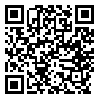Volume 13, Issue 1 (4-2013)
Iranian Journal of Medical Education 2013, 13(1): 39-48 |
Back to browse issues page
Download citation:
BibTeX | RIS | EndNote | Medlars | ProCite | Reference Manager | RefWorks
Send citation to:



BibTeX | RIS | EndNote | Medlars | ProCite | Reference Manager | RefWorks
Send citation to:
Dargahi H, Mohammadzadeh N. Faculty Members’ Evaluation by Students: Valid or Invalid. Iranian Journal of Medical Education 2013; 13 (1) :39-48
URL: http://ijme.mui.ac.ir/article-1-2213-en.html
URL: http://ijme.mui.ac.ir/article-1-2213-en.html
, hdargahi@sina.tums.ac.ir
Abstract: (29849 Views)
Introduction: Evaluation of university faculty members which is aimed to improve teaching quality is performed through several methods. One of the most common and conflicting methods is faculty evaluation by students. This method is commonly used in most universities in spite of controversy over its validity. This paper presents a glance at the current research literature on the viewpoints of faculty members toward their evaluation by students.
Methods: This study is a literature review performed using library studies and electronic databases. First, 64 articles in the area of faculty member evaluation were studied. Out of these articles, 42 ones were selected which met the inclusion criteria. The inclusion criteria encompassed articles related to teacher evaluation, faculty members, and students’ viewpoints toward teaching approaches of faculties, teachers’ characteristics, classroom management, teachers’ communication skills and their relationship with students. Using the keywords of evaluation, student, faculty member, and university, we searched in journals such as Iranian Journal of Medical Education, Journal of Research and Planning in Higher Education, Knowledge and Research in Education, and other specialized journals in medical education area. Using scientific search engines such as Iran Medex, Magiran, SID, PubMed, Google Scholar, ISC, Medline, and Scopus the articles published or indexed between 1991 and 2010 were retrieved. Other papers which evaluated teachers and faculty members from other aspects or via other viewpoints were excluded.
Results: The results were presented in three parts as “proponent to faculty evaluation by students”, “opponent”, and “teaching conditions affecting teacher evaluation by students”. The results showed that evaluation of teaching process must consider six aspects of content, students’ learning, classroom behavior, curriculum and materials, knowledge of faculty member, student characteristics (including material, students with high or low background, and postgraduate students), self-evaluation by the faculty member, evaluation by colleagues, educational administrators, and educational consultants and it must be compatible to organizational goals.
Conclusion: The viewpoints of most faculty members of national universities and other countries states that they basically consider evaluation by their students as a valuable and reliable source of information for feedback to teachers in order to improve the quality of education. But, they believe that interventional factors should be identified and considered in this method. They also believed that teacher evaluation by students should be a part of comprehensive evaluation system of faculty members. But if the evaluation results are going to be utilized in commendation and promotion of faculty members, it would be better to employ other evaluation methods comprehensively.
Type of Study: Review article |
Subject:
Teacher Evaluation
Received: 2012/07/10 | Accepted: 2013/03/26 | Published: 2013/03/26 | ePublished: 2013/03/26
Received: 2012/07/10 | Accepted: 2013/03/26 | Published: 2013/03/26 | ePublished: 2013/03/26
Send email to the article author
| Rights and permissions | |
 |
This work is licensed under a Creative Commons Attribution-NonCommercial 4.0 International License. |




